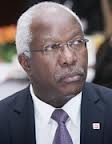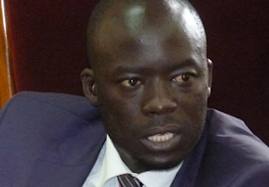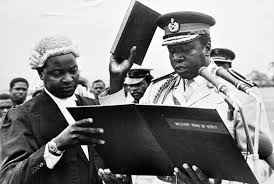Battered by a hail of seemingly incessant corruption scandals, Uganda’s accountability framework of laws, policies and institutions, are unlikely to protect its oil revenues according to the country’s financial Ombudsman, the Auditor General. It is less likely, says Mr. John Muwanga, to save the proposed Uganda National Oil Company, the state-owned corporation that will receive profits from oil when its start’s flowing. UGNOC, as it is referred to in technical circles, will be the single richest entity in the country once oil is commercialized. However with official graft reaching epidemic levels Muwanga’s frank assessment of Uganda’s preparedness to manage oil revenues even in the face of proposed reforms to tighten financial controls is a red flag. “ Gone are the days of the brown envelope type of corruption. Its sophisticated today, bigger in value and more complex” Muwanga said in an exclusive interview with the East African after issuing perhaps his most damning annual report detailing millions of dollars of theft of public money. “ The most disturbing pattern is that it involves collusion and manipulation of official processes,” he pointed out. “ We need a well-equipped, intelligent and well paid civil service” adding that the present cast was “ demoralized and poorly paid”.
The corruption season that first captured the public imagination after billions of shillings, some of it meant for disaster relief, was discovered in the Office of the Prime Minister, led to painful donor cuts. While the government line has been that its finances are sound thousands of civil servants have gone without pay including teachers, doctors and uniformed personnel. So acute is the financial squeeze that the Uganda police force has resorted to issuing maize flour and bean rations in lieu of salaries.
Officially the government has said the liquidity problems have little to do with corruption but other experts while conceding that new defense spending amongst others have applied pressure on government revenues-say the open season for corruption is to blame. While optimists consider the present problems as a bump on the highway to oil wealth once production starts- many wonder in sincerity how the oil sector can insulate itself from the corruption infestation outside.
In a report confidential report titled “Strategic Options and Recommendations for the formation of the Uganda National Oil Company” prepared for the Ministry of Energy by PricewaterhouseCoopers (PWC), the audit firm recommends that the government join the Extractive Industries Transparency Initiative or EITI.
The government is presently considering the board of the UGNOC, which is due to be incorporated shortly to participate in an anticipated new licensing round for exploration blocks. However just after PWC issued its report on 24th June 2011 debate ensued over the government proposal backed by the Ministry of Energy that the UGNOC be a regular company as opposed to a statutory body.
Three years later questions still linger on if UGNOC operations will receive adequate oversight. “ My impression was that at the time they wanted limited oversight,” said Muwanga, whose own insistence that UGNOC operations be directly audited by his office, failed.
The new petroleum law allows it as a private, albeit state owned company, to operate with relative independence. It includes however official protections such as indemnity for UGNOC’s directors from liability were they acted in the best interests of the company and other protections that state corporations enjoy.
PWC, which consulted for government on the issue, has warned in its report about blurred reporting lines and the risk of public distrust (given the record on corruption). Industry watchers who spoke to The East African where initial resources for the UGNOC will come from since the government finances are distressed and if private funding of a national oil company- should the government so raise revenue would be tantamount to private players acquiring equity in what would be national assets.
According to the PWC report for example even if normally a company incorporated under Uganda’s Companies Act would appoint its own auditors, the UGNOC being a state-owned company can be audited by Mr. Muwanga’s office under the National Audit Act and the Public Finance and Accountability Act. In two statutes have provisions requiring that where a company is a public corporation by virtue of state participation the Auditor General examine its books of account.
The Minister responsible would then present these books to Parliament. This route however is not direct (as would have been if the UGNOC were created by statute) and loopholes may yet emerge especially since the proposed national oil company’s Articles and Memorandum of Association have not been made public.
These governing documents would for example show when and if the state will seek private funding for the company, a process many fear will fall under the pall of corruption. Framers of the UGNOC envision it as an entity developed “ with commercial principles in mind” benchmarked against similar successful state-run corporations like Angola’s Sonangol or South Africa’s PetroSA.
However the operating environment in Uganda, its history of political meddling and now widespread graft are glaring challenges that could undue well-laid out policies, say anti-corruption campaigners. At the Auditor General’s office efforts to forestall these challenges have come in the way of a new internal department of petroleum audit. The AG presently reviews oil company expenses, which will later be recovered from their share of oil.The Office’s operational budget has also grown from 4 billion shillings in 2008, when oil discovery had just been announced, to 35 billion shillings this year.
Despite this Mr. Muwanga says a statewide culture of corruption challenges the most well organized response. The annual report just issued (ending June 2012) reads like a brochure of how corruption will manifest in the years when oil revenues fill state coffers. For example, just about a billion dollars of loan agreements were signed without parliamentary approval according to the AG. Many accounting officers continued to use their private accounts to do official business, the equivalent of carrying an ATM card with public funds around leading to about US 15 million dollars in funds “ not adequately accounted for”.
In the Office of the Prime Minister, the scandal that led to donor aid cuts the report said “impropriety in financial management, irregularities such as diversions, fraud, unauthorized payments and irregular withdrawal of funds” were pervasive. In some cases government officials would withdraw “huge amounts of money in cash” a phenomenon described as carrying around “sacks of money”. However garden variety fraud also dominated the report involving false accounting. Mr. Muwanga pointed out that one such instance was the payment of 5billion shillings for war-era reparations in Northern Uganda. The Ministry of Justice headed by Gen. Kahinda Otafire has accumulated a bill of 44billion shillings and paid out 10billion in the district of Lira however the claims in support of these payments “were found to have several inconsistencies that rendered them doubtful”
More so in the nearby Acholi region claimants had mushroomed from 1700 in 2006 to over 8000 in 2011, a bill that is now over 100billion. It’s such “technical” fraud involving the use of courts, court awards and manipulation of government systems that the AG is most weary of. In the absence of more rigorous public oversight Mr. Muwanga says Uganda’s corruption problem is systemic. “People with money want power and people with power want money. It does not add up” he says.
A version of this piece is in the East African here










